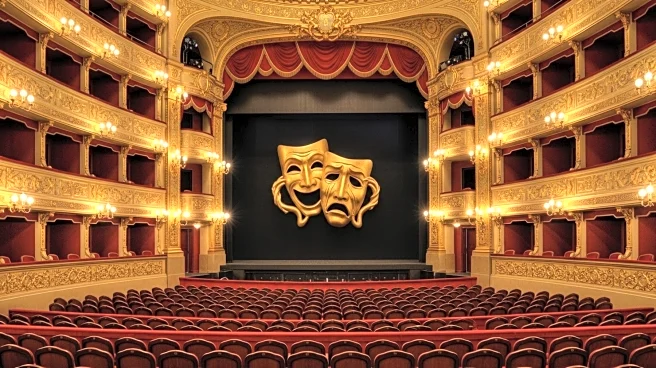What's Happening?
The Metropolitan Opera has launched its new season with an adaptation of Michael Chabon’s novel 'The Amazing Adventures of Kavalier & Clay.' The opera, composed by Mason Bates with a libretto by Gene Scheer, explores themes of Americanness, Jewishness, love, and pop culture during World War II. The opening night included statements from Peter Gelb, the Met's general manager, and Senator Chuck Schumer, emphasizing the importance of artistic expression and free speech. Their remarks were met with a mixed response from the audience, highlighting the contentious nature of the current cultural climate.
Why It's Important?
The adaptation of 'Kavalier & Clay' into an opera signifies a bold artistic endeavor, merging literature with operatic performance. This move underscores the Met's commitment to exploring diverse narratives and contemporary themes. The mixed reception to the opening night speeches reflects ongoing debates about freedom of expression in the arts, a critical issue in today's political and social landscape. The opera's focus on pop culture's transformative power resonates with current discussions about media influence and cultural identity.
What's Next?
The Metropolitan Opera will continue its season with performances of 'Kavalier & Clay,' potentially sparking further dialogue about the intersection of art and politics. The reception of this adaptation may influence future programming decisions at the Met, as well as broader discussions about the role of opera in addressing contemporary issues. Stakeholders in the arts community may respond to the mixed audience reactions, potentially advocating for more inclusive and diverse artistic expressions.
Beyond the Headlines
The adaptation of a complex novel like 'Kavalier & Clay' into an opera raises questions about the challenges of translating literary works into musical performances. This endeavor highlights the evolving nature of opera as a medium capable of addressing modern themes and narratives. The mixed audience reactions to the opening night speeches also reflect broader societal tensions regarding free speech and artistic expression, suggesting a need for ongoing dialogue and reflection within the arts community.









